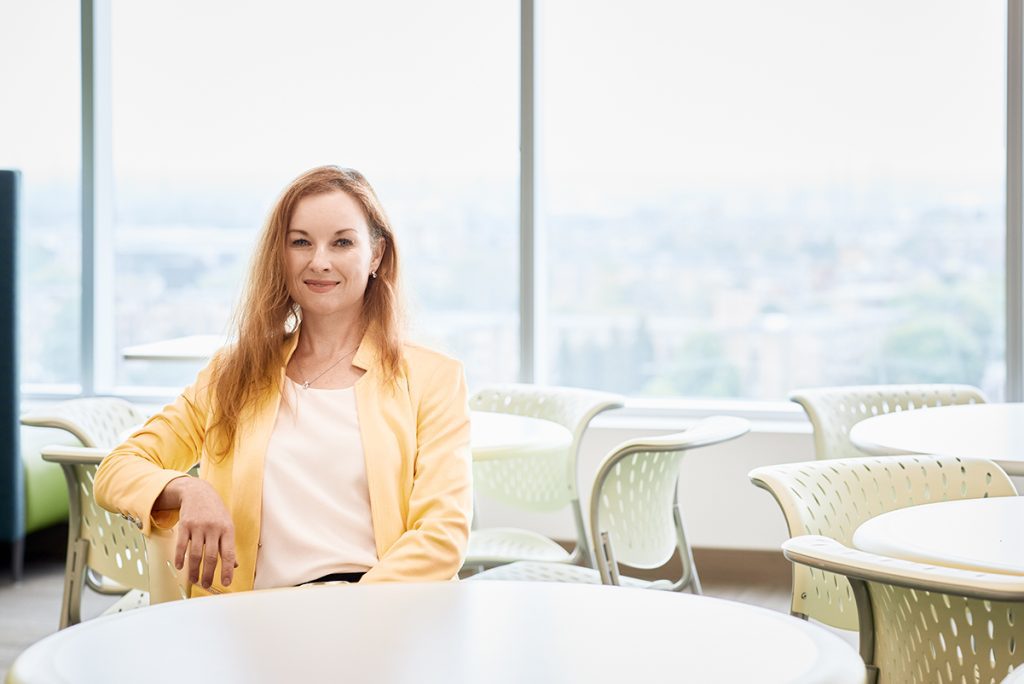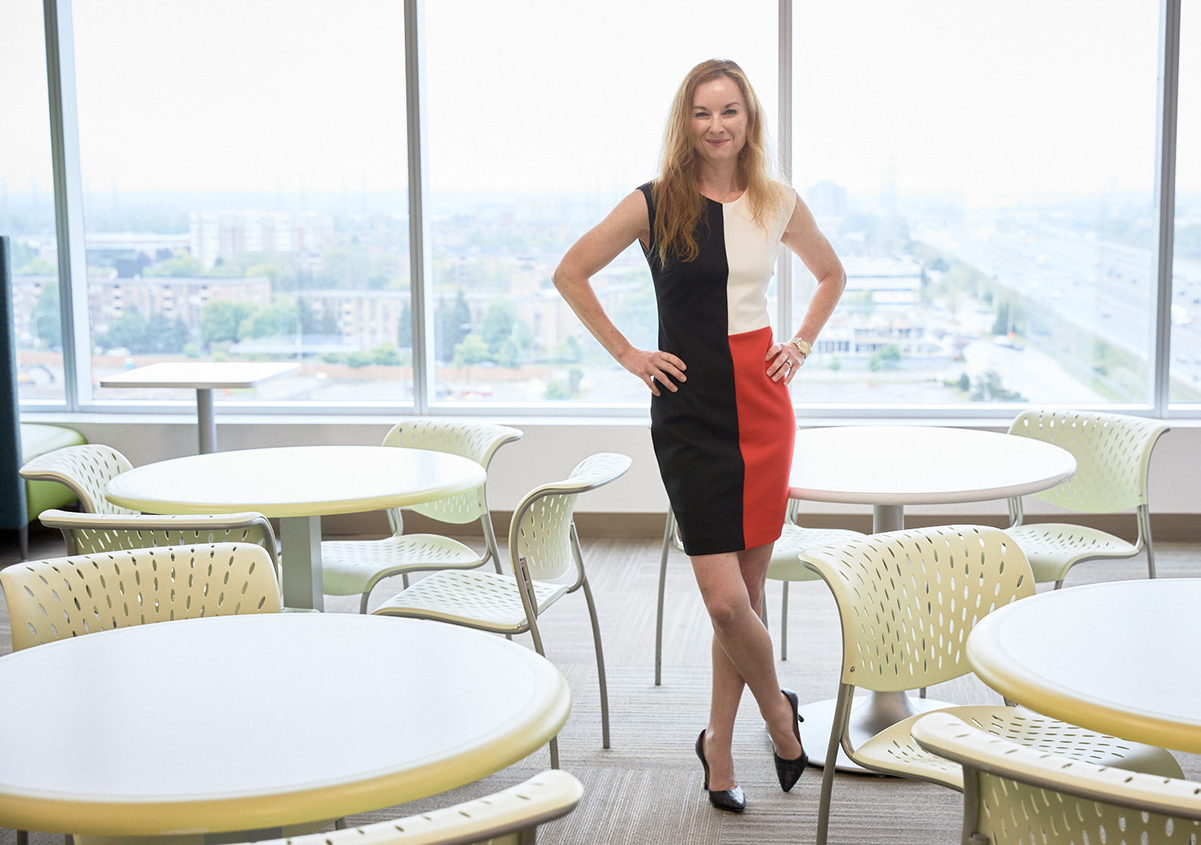[vc_row][vc_column][vc_column_text]When the Ontario government ordered the closure of non-essential businesses to help stop the spread of COVID-19, MPAC President, Nicole McNeill, already had a plan set in place.
Even if the office doors would close, MPAC was going to make sure that communication channels were wide open.
Prior to closures, McNeill and her team spread themselves at a safe distance around her office. Out of adequate seating, McNeill was sitting on the floor when the group came to a decision on how to face what was ahead: they wouldn’t have every answer, but they would welcome every question.
With a staff of approximately 1800 people, you can only imagine the amount of questions they received. But with mental health being a priority for the company, she knew that keeping an open dialogue was the right decision.
“We didn’t have all the answers because nobody did. But the one thing that we knew was at a minimum, we have to communicate and communicate and communicate,” she said.
For MPAC, open communication has been the key in helping to ensure good mental health amongst staff. Since the lock down has been in place, the company launched initiatives to keep that open flow of communication, and to ease the stress while working from home.
MPAC holds ‘Virtual Leader Chats’ three times a week where professionals in the medical and wellness fields help staff navigate the uncertainty. They also hold ‘Ask Us Anything’ sessions where all staff members can ask the executive management group anything. Even if they don’t have the answers, McNeill hopes these sessions allow the staff to put their anxieties at ease. And for those who use fitness as a form of wellness, the company hosts virtual yoga, where employees can participate with colleagues in easy-to-do at-home workouts.
The initiatives have had an overwhelmingly positive result. Over 80% of the organization participates in the optional calls and attendance has not wavered.
Offering experiences that bring employees a sense of relief and create a community—especially during a time like now— is something that McNeill is passionate about.
“When you have a leadership role, you have power and you can use your power for good, or you can use your power for bad,” she said. “ I want to use that power for good. So, through COVID-19, I’ve been trying to use it for good by making sure we talk about mental health and making sure that we make employees feel safe.”
For this week’s Women Who Lead spotlight, we spoke with Nicole McNeill about the importance of making mental health a priority in the workplace and using your power for good.[/vc_column_text][vc_text_separator title=”Q&A”][vc_column_text]Tell us your story, how did you get to where you are today?
I’m actually an accountant, I’m a CPA. I went into accounting knowing that I wanted to go into business and it was a good foundational, educational route. You learned about business, you learned about finances and so on, but my career always took me into a lot of different directions.
In my career, I’ve managed facility portfolios, I’ve managed HR. I was even the Chief Information Officer in IT for three years at MPAC. I’m now almost in my 10th year at MPAC, and I think between being the Chief Financial Officer at MPAC and the Chief Information Officer, it gave me a nice lens of how the business operates and what they need.
I took over in April 2018, and I’m the first full-time female president at MPAC—we had an interim president who was female while they were doing the transition in recruiting me—the rest is history.
Looking back at your career then, is there a defining moment that helped you become the leader you are today?
There’s probably many different moments; I believe that all of our experiences shape us, and sometimes it’s the hardest ones that shape us more than the easy ones. I went public with our staff on anti-bullying day that I was bullied early on in my career and that it was really hard. I basically confronted the bully, who was my boss, and when the situation didn’t resolve itself, I decided to leave.
The pact that I made with myself, was I would never be that leader. I would never be the person that bullied other people. So that would be one defining moment—whatever role, whatever company, or however I worked with people, I would always make them feel good and never bad, because mental health is important to all of us. I’ve had many different defining moments from a business standpoint, but that was definitely a personal one.
And what sets you and your company apart? Is it that mindset or would you attribute it to anything else?
The culture at MPAC is great. No matter what MPAC has faced, adversity, change, legislation or scrutiny, we always bounce back. We bounce back, we close our curtains, we figure out how we’re going to solve the issue and then we move forward from there, and we move forward in a stronger position. I think that’s probably one of the things I fell in love with at MPAC, that we’re resilient no matter what—we get through it.
One thing that I’ve been told is that I bring an authentic leadership style. I always look at things and I say, “How would this affect me?” I bring that mindset to work with me and I just try to be a leader and be a human leader. I think it makes me more approachable than what most people would anticipate in a leader. I’m the same as everyone else, “I put one pant leg on at a time,” as they say.
With that mindset, “one pant leg at a time,” and being relatable, why was it important for MPAC to build a feeling of community during COVID-19?
It was instinctual for all of us. I remember the moment before we went into the lockdown, we were all sitting in my office like, “Oh my God, this is real.” And this was before the government came out with restrictions; they were just starting to talk about physical distancing at this time.
We ran out of chairs and we were all sitting in different places, I was sitting on the floor and we had this conference phone in the middle and we’re like, “Okay, we’re going to talk to all of our managers about what’s actually happening.”
We didn’t have all the answers because nobody did. But the one thing that we knew was at a minimum, we have to communicate and communicate and communicate. And even if we don’t have the answers, we have to communicate the questions.
I think that was the defining moment for me when I remember how this all broke out, we had such success from just being open and honest with people that we took it all the way through. The frequency of how we communicated is something I think some people would have looked at it and said, “Well, are you guys communicating too much?” But we knew it was the right thing to do. We said, “We have to, our staff expect it—if we have these questions every day, they have these questions every day.” So that was really the approach that we took.
It’s how the Virtual Leader Chat was born. We knew we could do it, we knew the technology worked and so we just continued to apply it and brought forward questions that staff would ask. I think proof is in the pudding when you actually see the questions that they put forward—they’re not afraid; I think that a couple years ago they wouldn’t have been as forthcoming with a lot of the questions they’ve brought forward.
It felt right; sometimes you have to follow your gut, and I think all of our guts said ‘This is the right thing to do.’
It was this constant open communication. Some employees email me directly about different issues, and none of that ever happened before. We’re 1800 people across the province of Ontario, many I’ve met, but others I haven’t. Now I feel like I know everyone, I feel more connected than I ever have with this organization.


With that new kind of connection, do you feel you’re going to move forward with putting community and people’s mental health at the forefront of MPAC once COVID-19 has settled down?
We’re not going to lose what we’ve built. We’ve found this little gem of a model that keeps all of the topics fresh. When I think of the things that come up now, they would have gone through some long process at a meeting, waiting until someone visited the right office, and then it would go to another meeting and then a project would come out and so on. Now, not only are we making a decision or dealing with it quicker, we’re really transparent, even in the process.
Once we go back to normal to keep that going, will it be at the same frequency? Probably not, but I definitely think we’ll have these sessions with myself and the executives bi-weekly and we’ll keep this dialogue going. We’re stronger than ever, having our fingers on the pulse of everything right across the province—we’ve got 27 different offices and 1800 staff, so that’s a lot to keep on top of. But, we’ve got this beautiful little formula and I think we’ll keep it going.
I think there’s a lot of lessons that have been learned during this time, and what’s going to be telling is the companies who come out on top and push through.
I’m a bit of an optimist, you can probably see that. But I like to think of Winston Churchill and “Never waste a crisis.” What’s happening in all aspects of the world right now is horrible, especially with this virus. But let’s not waste this crisis, let’s actually utilize it. We told our staff, “You’ve got to work differently. So if you can find better ways, share them and let’s keep them going. Let’s not go back to our old ways if there’s a better way.”
One of the things we did is set up an email box specifically for ideas, and MPAC employees have emailed us ideas of things they’ve done and tried, or things they think we should try. We have a little team now that’s reading through all of these ideas so that we can keep them going, and then we share them on our virtual leader chats. It keeps everybody engaged.
How do you define success?
I think feeling fulfilled—we all want to feel like we have a purpose, and I think we all have a purpose that gives us meaning. When you have a leadership role, you have power and you can use your power for good, or you can use your power for bad. I want to use that power for good. So through COVID-19, I’ve been trying to use it for good by making sure we talk about mental health, making sure that we make employees feel safe and making sure that we do anything that we can even well outside of the normal sort of work boundaries.
We’ve created this sense of community and I do that because I can, I have that ability. So I want to use that power for good, and I think that’s the call to action for all of us right now. I feel a sense of accountability to all the staff at MPAC. If there’s any way we can make them feel like a rock for their family or feel like they can get an extra hour of sleep at night because they’re not worried about the job, then it’s incumbent upon me to do that. That makes me feel good, so I think that’s how I define success.
On the other end of the spectrum, then what was your biggest failure and what did it teach you?
I think having humility comes from failures and knowing that everyone does fail. I’ve had many failures in my career. I think the biggest thing that I’ve learned is you’re not always going to get what you want and when you want, but you’d have to get back up again and you have to move forward. If you just keep moving, eventually you’ll be a better and stronger person for it.
What piece of advice would you give women in business?
Believe in yourself. Don’t get caught up in any kind of hype, but just believe in yourself and work hard. Look for mentors and look for people who will support you. Throughout my career, I searched and I searched for people who not only mentored me, but inspired me; my favourite word is inspire. Look for someone, something or some incident that inspires you, it’s probably the most powerful energy source that I’ve ever found. If you can be inspired by something, you can create a movement and then opportunities are sort of endless. It doesn’t become hard anymore because you’re inspired.
What would your best piece of advice be for your younger self?
For my younger self? You always get through it.
You’ll get through things, things will pass and you’ll move forward and be stronger after it all. All of those setbacks in the moment, they feel like it’s never going to go away, but once you get to the other side, you actually look back and you say, you know what? I’m stronger because of this.
It’s definitely hard to go through at the moment. But like you mentioned earlier, I think we do usually turn out stronger from those instances.
Someone once told me that while you’re on your path, the road seems like it’s going up and down; but when you look in the rear view mirror and back at your life, it looks like a straight line because you’ve moved forward. I think that’s a powerful saying, because it’s true. When you look back, it’s straight, but going forward, it looks so confusing and windy.
That’s a great analogy. Is there anything else you wanted to say about being a leader, or leading MPAC?
I’m proud of the work that I do and I feel blessed to have the role that I have. It’s a dream job, really. I feel that right now I have a lot of purpose and a lot of opportunity to give, and so that’s what I’m going to do. I feel blessed that I’m able to be in this position and have this kind of influence, but we can all influence in our different ways. As I said before, I’ve always believed that when you have power, you can use it for good or you can use it for bad and I’m gonna do everything I can to take the power that I have and use it for good. [/vc_column_text][/vc_column][/vc_row]












